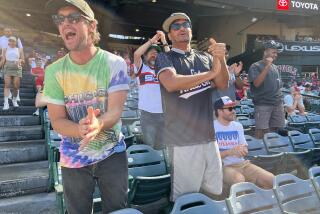Montreal Just Needs to Be Exposed to Winner
George Steinbrenner loves to peddle the most popular myth in baseball: The citizens of Montreal will not support the Expos.
“If the fans don’t get out and support the team, I’m for taking them out of there,” he says.
The fans don’t support the Expos? Based on what?
Baseball executives--and Steinbrenner is far from alone here--simply repeat those words. Say it, and say it again, and so it must be true.
Imagine a restaurant in an unpopular part of town. The ambience is dull. The food is innovative but inconsistent, because young chefs routinely leave for better-paying jobs at higher-profile restaurants. Instead of improving the restaurant, the managing partners bicker among themselves. So do you blame the disappearing customers?
Olympic Stadium, where the Expos play, is deadly dull and a civic disgrace. “The Big Owe,” the locals call it, since they’re still paying taxes on its construction for the 1976 Olympics.
Yet the fans supported the Expos in the glory days of Gary Carter and Andre Dawson, Tim Raines and Steve Rogers, with more than 2 million flocking to Olympic Stadium in each of the four non-strike seasons from 1979-83. In 1983, when the Chicago White Sox won the American League West by 20 games and Steinbrenner’s New York Yankees won 91 games, the Expos outdrew them both, at 2.3 million.
In 1994, when the Expos boasted the best record in baseball, they averaged 31,608 in their final 29 home games, including a three-game weekday series against the Atlanta Braves that drew 131,874. Then came the strike.
The season was gone. Within months, so were Larry Walker, John Wetteland, Marquis Grissom and Ken Hill. Within three years, so were Pedro Martinez and Moises Alou.
The Expos drew 1.6 million in 1996, their last winning season. Attendance plummeted below the million mark in 1998 and ‘99, as the Expos finished a combined 76 games out of first place.
So fans won’t support a crummy product in a crummy stadium. This is unusual? And why invest money and emotions in a team amid constant reports of the team moving to the United States and Shakespearean back-stabbing within the ownership group? Move the Expos? Best of luck finding a better market. Did you know that 3.4 million people live in the Montreal metropolitan area, more than in 11 U.S. markets with major league teams and double the number in the home of Commissioner Bud Selig’s Milwaukee Brewers?
Hockey town? No doubt, but the fans also demand a winner of their hallowed Canadiens, who missed the playoffs in consecutive seasons for the first time in 78 years. The Canadiens failed to sell out 28 of 41 home dates and resorted to hawking two-for-one tickets when the Mighty Ducks came to town.
Do kids play baseball? They sure do, with Baseball Quebec reporting amateur participation more than doubled from 1969, the Expos’ inaugural season, to 1994, when the 58,000 youth players included French-Canadians Eric Gagne of the Dodgers and one of the Angels’ top prospects, triple-A pitcher Steve Green.
Does the provincial government care? Not much, but the Quebec government did promise a construction loan for a new ballpark, which is more government help than the Twins have received in Minnesota and the Marlins in Florida.
In a cozy downtown ballpark, with a competitive team, the Expos could flourish. Montreal is not Cleveland, where a city needed a ballpark to revitalize its downtown.
The site for the proposed 36,000-seat Labatt Park, adjacent to the new Molson Centre arena, lies within an already lively downtown. Summer is a celebration in Montreal, where people freely walk the streets and enjoy internationally renowned jazz and comedy festivals.
Baseball will never be an easy sell, or an overly lucrative business proposition, in this bilingual city.
The ascension of the Parti Quebecois, and its advocacy of Quebec secession, drove many among the province’s English-speaking minority--some of the staunchest baseball fans--to Toronto or Vancouver. The corporations fled too, and with them season tickets and sponsorships.
The long-dormant Quebec economy is reviving itself, but neither former managing partner Claude Brochu nor current managing partner Jeffrey Loria figured out how to tap the French business base. The Expos also haven’t figured out how to sell baseball to a thriving community of European and African immigrants (one of whom, outfielder Ntema Ndungidi from Zaire, was a first-round draft pick of the Baltimore Orioles in 1997).
Loria pulled English radio broadcasts off the air, citing the lack of a suitable bid for the rights, a dollars-and-cents decision that made no sense to increasingly alienated fans. And the Expos face the same exchange-rate hardship as the Canadiens and other NHL teams--salaries payable in U.S. dollars, but local revenues collected in weaker Canadian dollars.
With increased revenue sharing--yes, Mr. Steinbrenner, that’s your money--and imaginative marketing, the Expos could stir fans from their apathy. Heck, the Braves failed to draw a million as recently as 1990, and the Indians and San Francisco Giants dropped below the million mark in 1985. No problems with those franchises today.
Is it too late for Montreal? Reports indicate Loria, a New York art dealer, might soon buy out his Quebec partners and propose a move to the United States.
In Quebec, the locals enjoy poutine, a gooey mess of cheese and gravy atop French fries. If Loria tries to blame the departure on a lack of fan support, he ought to be dropped in a vat of poutine.
More to Read
Go beyond the scoreboard
Get the latest on L.A.'s teams in the daily Sports Report newsletter.
You may occasionally receive promotional content from the Los Angeles Times.











